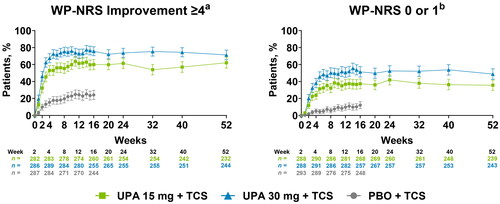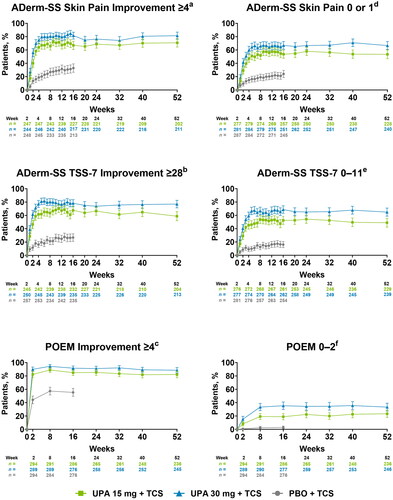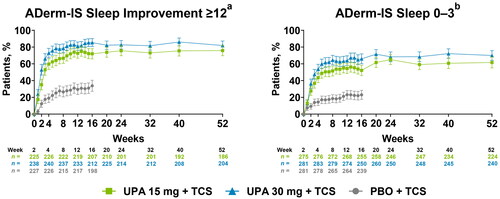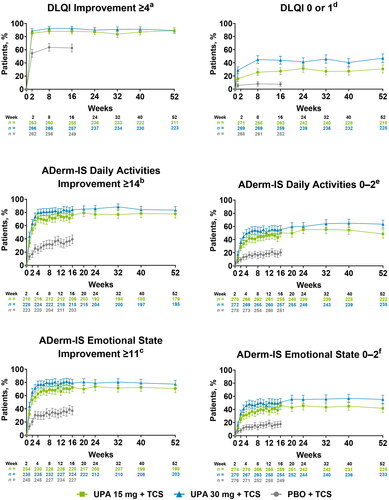Figures & data
Table 1. Baseline demographics and characteristics for patients enrolled in the AD Up study.
Figure 1. Improvement in itch through 52 weeks of treatment with upadacitinib plus topical corticosteroids. Error bars indicate 95% confidence interval. Data are represented as observed cases. aAssessed in patients with WP-NRS ≥4 at baseline. bAssessed in patients with WP-NRS ≥2 at baseline. PBO: placebo; TCS: topical corticosteroids; UPA: upadacitinib; WP-NRS: Worst Pruritus Numerical Rating Scale.

Figure 2. Improvement in skin symptoms including pain through 52 weeks of treatment with upadacitinib plus topical corticosteroids. Error bars indicate 95% confidence interval. Data are represented as observed cases. aAssessed in patients with ADerm-SS Skin Pain ≥4 at baseline. bAssessed in patients with ADerm-SS TSS-7 ≥ 28 at baseline. cAssessed in patients with POEM ≥4 at baseline. dAssessed in patients with ADerm-SS Skin Pain ≥2 at baseline. eAssessed in patients with ADerm-SS TSS-7 ≥ 12 at baseline. fAssessed in patients with POEM ≥3 at baseline. ADerm-SS: Atopic Dermatitis Symptom Scale; PBO: placebo; POEM: Patient-Oriented Eczema Measure; TCS: topical corticosteroids; TSS-7: 7-item Total Symptom Score; UPA: upadacitinib.

Figure 3. Improvement in sleep through 52 weeks of treatment with upadacitinib plus topical corticosteroids. Error bars indicate 95% confidence interval. Data are represented as observed cases. aAssessed in patients with ADerm-IS Sleep score ≥12 at baseline. bAssessed in patients with ADerm-IS Sleep score ≥4 at baseline. ADerm-IS: Atopic Dermatitis Impact Scale; PBO: placebo; TCS: topical corticosteroids; UPA: upadacitinib.

Figure 4. Improvements in quality of life, daily activities, and emotional state through 52 weeks of treatment with upadacitinib plus topical corticosteroids. Error bars indicate 95% confidence interval. Data are represented as observed cases. aAssessed in patients with DLQI ≥4 at baseline. bAssessed in patients with ADerm-IS Daily Activities score ≥14 at baseline. cAssessed in patients with ADerm-IS Emotional State score ≥11 at baseline. dAssessed in patients with DLQI ≥2 at baseline. eAssessed in patients with ADerm-IS Daily Activities score ≥3 at baseline. fAssessed in patients with ADerm-IS Emotional State score ≥3 at baseline. ADerm-IS: Atopic Dermatitis Impact Scale; DLQI: Dermatology Life Quality Index; PBO: placebo; TCS: topical corticosteroids: UPA: upadacitinib.

Supplemental Material
Download MS Word (134.6 KB)Data availability statement
AbbVie is committed to responsible data sharing regarding the clinical trials we sponsor. This includes access to anonymized individual and trial-level data (analysis data sets), as well as other information (e.g., protocols, clinical study reports, or analysis plans), as long as the trials are not part of an ongoing or planned regulatory submission. This includes requests for clinical trial data for unlicensed products and indications.
These clinical trial data can be requested by any qualified researchers who engage in rigorous, independent scientific research, and will be provided following review and approval of a research proposal, Statistical Analysis Plan (SAP), and execution of a Data Sharing Agreement (DSA). Data requests can be submitted at any time after approval in the United States and Europe and after acceptance of this manuscript for publication. The data will be accessible for 12 months, with possible extensions considered. For more information on the process or to submit a request, visit the following link: https://www.abbvieclinicaltrials.com/hcp/data-sharing/.html.
